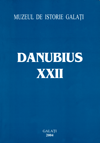Un aspect controversat al istoriografiei privind regimul comunist: caracterul naţional al rezistenţei armate anticomuniste (1948-1962)
A controversial aspect of the historiography dealing with the Communist regime: the national character of the anti-Communist armed resistance
Author(s): Liviu ŢăranuSubject(s): History
Published by: Muzeul de Istorie „Paul Păltănea” Galaţi
Summary/Abstract: During the Communist rule, the resistance against Communism, at the beginning of the 50ies, was a taboo subject. After the revolution from 1989, many researchers took up studies regarding the resistance against Communism in Romania. It was a big surprise when the archives of the Security revealed the existence of many resistance groups in the whole country. These groups were constituted by former members of the historical parties or of the Legionary Movement. Without any support from the West, without resources and with a small number of men standing against the forces of the security, these groups didn’t have much chance to succeed in their struggle. Almost every member of the resistance movements was either put in jail either executed. The fight also incurred losses to the Security or Militia forces. At that time, the dead from the side of the Security or Militia were considered as heroes, while the members of the resistance groups passed as hooligans or terrorists. This perspective has been seriously challenged after 1989 and today the task of Romanian historiography is to depict the situations of those days in an objective way. Another disputed subject of the Romanian historiography is the national character of the resistance groups. Most of the groups were constituted of Romanian ethnics who fought against Communism not prompted by any foreign factor, but as a result of their displeasures regarding the economic and political situation, of the anti-Soviet feelings which were prevalent in the Romanian villages. Some of these groups had some hopes regarding an American intervention, nevertheless, the fighters were moved only by their own displeasures with the newly installed system. For the national character of the resistance also pleads the diffusion of the resistance groups all over the country and the fact that most of their leaders were Romanian intellectuals. The opponents of the national character of the resistance bring two major arguments in support of their position: the resistance lacking a national unitary character and a nationally acknowledged leader. The disputes on this theme are still open and only some further thorough documentary researches may lead to a properly established conclusion.
Journal: Danubius
- Issue Year: XXII/2004
- Issue No: 1
- Page Range: 147-156
- Page Count: 10
- Language: Romanian

